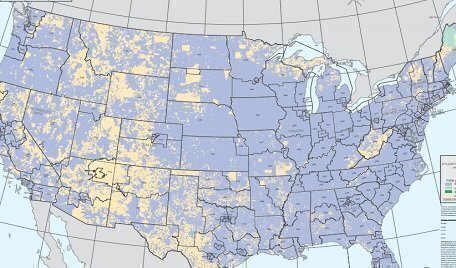Faced with the prospect that a lower court may issue a new ban on adding a citizenship question to the census, the Trump administration on Tuesday evening made an urgent plea for the Supreme Court to reject a claim that its 2020 plan was the result of racial discrimination.
 The Justices have two and maybe three more days this week for issuing opinions, and the census ruling thus could come at any time.
The Justices have two and maybe three more days this week for issuing opinions, and the census ruling thus could come at any time.
The administration made its new and highly unusual plea after a federal appeals court gave a federal trial judge in Maryland permission to review the bias claim anew, and as one of the appeals court judges actually suggested that the trial judge consider imposing a fresh order to forbid the citizenship inquiry.
The administration noted that there are only five days left before the Census Bureau has said it needs to know what to put on next year’s census forms, so it asked the Justices to expand their forthcoming decision to finally resolve the bias issue without new legal briefs or a hearing. It is very rare for the Court to deal with a major issue, especially one arising under the Constitution, without a full and penetrating review.
The racial bias question arises under the Fifth Amendment’s guarantee of equal protection, under the Due Process Clause.
In effect, the administration is asking for what is called a “summary” decision on the race question – a quick mode of decision that is usually applied when a case is relatively free of heavy controversy and thus does not need deep exploration.
Rather than waiting for developments in the lower courts and in order to avoid the racial issue coming up to the Court on an emergency basis later this week, the administration said in its new filing, the Justices should reject the bias charge now by finding that there is no evidence to support it.
Although the Justices have been examining the census dispute on the basis of other issues of federal laws and the Constitution, with no attention to any racial factor, the challengers to the citizenship question in recent days have claimed that they have new evidence of an anti-Hispanic motive by Commerce Secretary Wilbur Ross and other government officials in planning to ask everyone in America about their citizenship.
The administration, in response to those new complaints, has made strenuous efforts in lower courts to show that the new evidence is not trustworthy and definitely does not provide a basis for concluding that Ross or other officials acted out of a discriminatory motive. The citizenship question was planned as a way to gather data for use in enforcing federal voting rights laws, not to suppress the vote of Hispanics or shut out non-citizen Hispanics from the political community, the administration has contended.
The administration failed earlier this week to persuade the trial judge in the Maryland case to forego any new review of the race issue and similarly failed on Tuesday to persuade the U.S. Court of Appeals for the Fourth Circuit to prevent any further exploration of that controversy.
In a 2-1 decision, a three-judge panel of the Fourth Circuit Court, where both sides have appeals pending, returned the case to U.S. District Judge George J. Hazel of Greenbelt, MD, allowing him to move forward to examine the discrimination claim.
One of the three members of the panel, Circuit Judge James A. Wynn, Jr., in a separate opinion for himself alone, openly suggested that Judge Hazel consider promptly issuing a new order to forbid the inclusion of the citizenship question while the new review proceeds. Judge Wynn went even further, suggesting that the judge could apply a less-demanding test of the new evidence in determining whether it proved a racial motive.
The other judge approving the return of the case, Circuit Judge Robert B. King, did not express any views on either point. Circuit Judge G. Steven Agee dissented, indicating that he would not have returned the case for the further review.
Within hours of that action, both the challengers and the Trump administration notified the Supreme Court about it. The challengers did not recommend any specific action by the Justices, but the administration explicitly called for a final ruling to reject the racial claim.
The administration noted the suggestion by Judge Wynn that a new order temporarily banning the citizenship question should be considered by Judge Hazel. If that occurs, the new filing said, the administration would rush to the Supreme Court to get an emergency order to thwart any such action. That would mean, it noted, that the Justices would have to address that claim “on a highly expedited basis” with a June 30 Census Bureau deadline looming.
Judge Hazel, in an earlier ruling against the inclusion of the citizenship question, did so on the basis of challenges other than race bias. He ruled then that the evidence did not prove the discrimination claim. But he changed his mind this week, concluding that the challengers’ new evidence raised a “substantial issue” that should be examined further.
The challengers have argued that there is time for such a new review because they dispute the June 30 deadline and have cited a Census Bureau official’s statement that the true deadline for finalizing the census forms is October 31.
Lyle Denniston has been writing about the Supreme Court since 1958. His work has appeared here since mid-2011.







